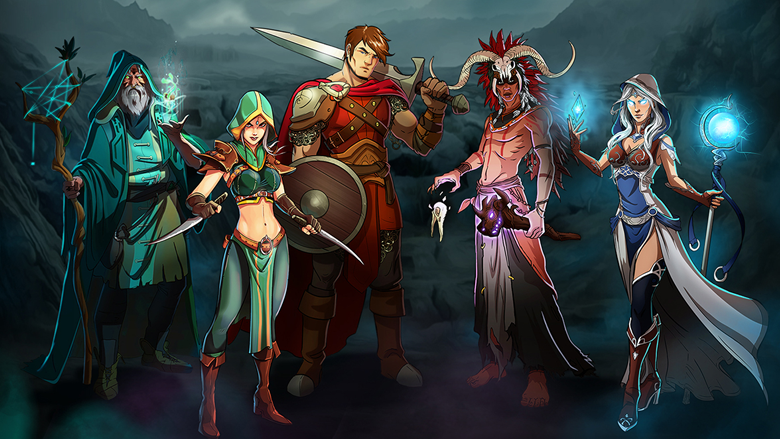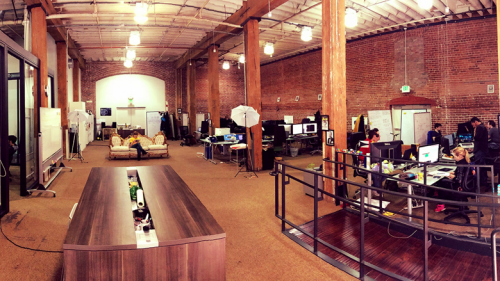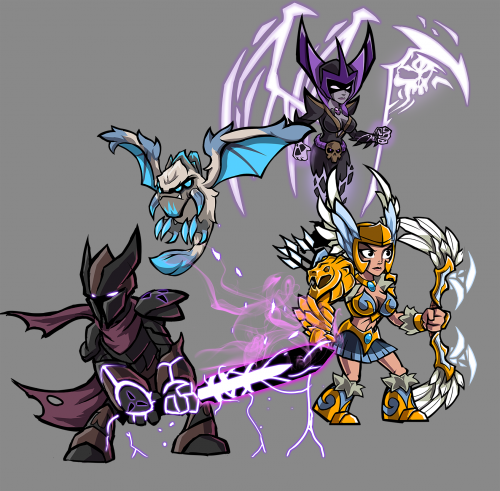JuiceBox Games, which was founded 3.5 years ago by former Zynga employees, is closing. And this is despite two ready-made and quite successful games, a feature from Google and Apple and $8 million earned. To explain why this happened, the creator of the studio, Michael Martinez, wrote a large article for the portal Medium.com . We have translated the text and are sharing it with you.
In the image – art to StormBorn
After 3.5 years, I am disappointed to admit that we are closing JuiceBox Games. We launched our studio in San Francisco in order to create the coolest, most interesting mobile games. Amazing investors – Initial Capital, Index Ventures, General Catalyst, Maveron, Scott Dale, John Riccitiello and others – invested $2.54 million in us during the seed round. On our way, we have faced both victories and defeats. And in the end, it didn’t work out.
I want to share some thoughts that arose in the process. No doubt, some of them will seem contradictory, but when you build a business, the main task is precisely to reconcile conflicting points of view and make optimal decisions.
I am very proud of what we at JuiceBox Games have achieved during our existence:
- we assembled a team of 36 people;
- launched 2 games, HonorBound and StormBorn;
- we have gathered a gaming community with a total number of 5 million people;
- players spent $8 million in our games;
- our HonorBound has been on the 31st place in the iPhone box office top in the USA;
- reached 1st place in the RPG/card game category in 28 countries;
- received features from Apple and Google;
- The average HonorBound rating in App Stores was 4.5 stars.
What happened?
The goal is success
From the very beginning, we invested in JuiceBox Games in full. We didn’t have investors, we didn’t have a team, but we set out to launch a studio without fail. For a couple of weeks we gathered in the dining room of Jason (Jason McGuirk), co-founder of the studio, – approx. editorial offices), then quickly found a small office.
JuiceBox Office
We have never considered the studio to be some kind of parallel project. Our ultimate goal was to create something big and valuable, not to sit and think what could go wrong. Self-confidence and willingness to put everything on the line are necessary components when it comes to starting a company from scratch.
And now what?
It’s amazing how quickly after the first successes this question arose – “what now?”. Goals that seemed unattainable were quickly left behind. The first investors, the closing of the seed round of investments, employees in key positions, trial launches of projects, a feature in Apple, $50 thousand per day of revenue – all these were important moments, but the next milestone always loomed ahead. When you build a long-term and growing business, you don’t have the opportunity to rest on your laurels.
What-what did we promise you?
It seems that there should be no difficulties here, but in fact it is not at all easy to fulfill promises on time. We have set a goal for ourselves – first to clearly identify the tasks, and then to consistently carry them out. And, it seems to me, we have met the expectations of our players, investors and employees. When we first met with Kristian Segerstrale from Initial Capital, who later became our main investor and joined the board of directors, he liked the idea of the project, but he wanted to see more. He asked us to show an extended demo of the game and set a deadline of 6 weeks. After 6 weeks, he played the demo, made the final decision and invested in us at the seed round of investments.
Characters from HonorBound
I am especially proud of the design level of the final product. We have launched 2 games, both are complex, with a lot of content. This is a serious achievement in all areas at once: in programming, art and game design. Every member of the JuiceBox team tried to make the game better, and the goal was considered achieved only when the next stage was launched, and users gave positive feedback. The new feature was not considered ready until we could not play on our smartphones. All cool new features got to the players only at the stage of full readiness.
Why did we fail, or the mistakes we made
The wrong side of the gaming market
Game Dev is an extremely complex business. In 2012, when we were just starting out, the highest-grossing were Simpsons: Tapped Out, DragonVale and Kingdoms of the North. Soon the market began to stagnate, the tops of the charts for the next three years were occupied by Supercell, King, and Machine Zone. By the time we released our next game in November 2015, our competitors were not only the old games that have only strengthened their positions since 2012, but also the favorites of the last three years (sequels, slots, Contest of Champions, Hearthstone, Summoners War, and so on). The stakes have increased, and so have the resources needed to launch a successful game.
Over the past two years, I have often heard venture investors complain that games are a business where everything is tied to hits. It’s the truth. But if the game did manage to become a hit, then this is a business where the annual turnover is estimated in billions of dollars (which is usually what studios focus on in their portfolios for venture funds).
The path to success includes the following points:
- you need to use new distribution channels (as in the past Zynga with games on Facebook);
- it is necessary to enter the market as early as possible, and to invest the fruits of the first successes in strengthening leadership positions – through marketing or through preparing the ground for future games;
- and, in fact, we need a hit (which is extremely difficult!).
Our approach
I still believe that our approach, which was to create high-quality midcore games, was the right one. Investors bet on us because we had experience in creating games, and because they saw a real opportunity for success. With HonorBound, we achieved the tasks that we originally had in front of us – we launched a game that was different from others, and our audience appreciated it. We gathered the accumulated experience and put it into another RPG, and it was the right strategy.
The performance of our next game, StormBorn, was better than that of the first project. But the visibility of applications has changed dramatically since the launch of the first title, and therefore StormBorn scored only 10% of downloads of the first game. (In parentheses – without any meaning – I note: if StormBorn had launched in 2014, and received the same number of downloads as HonorBound, the JuiceBox story would have turned out quite differently).
It so happened that our company depended on each subsequent project. The success of the first game was enough to launch the second game. The proceeds from the second game were not enough for the third, so we “collapsed”.
Our mistakes
We have not launched a game that would bring a stable income to JuiceBox, would allow us to expand the infrastructure and develop other games. It’s very simple: we never made a good enough game. Which raises a legitimate question, but actually, why didn’t this happen? That’s because creating games is incredibly difficult! It’s a fiendishly difficult task: to create a work of art that functions like a business. Nothing beats creating a game from scratch. It requires a monstrous amount of investment and labor.
There are two ways to make a business out of the game.
1. A huge number of installations (thanks to IP or virality) with average metrics bring a lot of money.
2. The key metrics are excellent, which gives an increase in revenue and profits (due to paid traffic or organic).
To be honest, our games have failed on all fronts. There were neither millions of installations, nor excellent key metrics. We tried to improve the key metrics to make the game profitable (see point number 2), but we could not achieve sufficient improvement in the indicators (either due to improper allocation of work resources, or due to improper management, or because the game was simply poorly made).
At some point after HonorBound launched, I received feedback from two very successful investors with extensive experience in the gaming industry. The reviews were contradictory:
1. (2 months after the global launch). This game didn’t fire. When will you move on to the next project?
2. Put everything you have into HonorBound. Don’t get distracted by the second project or anything else.
And how would you like to respond to such a feedback? Despite the fact that HonorBound’s metrics were not perfect, we believed that she would feed the company (which she did for a while). So we chose the second way and tried to improve the metrics of the game. As I already mentioned, we never managed to make a long-term source of income from the game (although HonorBound constantly brought in revenue (more than $1.2 million in the last 12 months alone), this was not enough to finance the development of future games). In addition, our goal was to launch a successful developing game, not a project that barely keeps afloat (although this is also very difficult to achieve!). As soon as we realized that HonorBound would not become such a game, we directed all our efforts to the second project.
What I learned
It’s all about marketing
The question “what is your marketing strategy” CANNOT be answered with “make a great game”. A great game is the main requirement in this case, and, in principle, it may be enough. But it’s better to make it easier for yourself and develop an excellent marketing strategy as well. The fact that we were unable to do this was the main reason for the closure of the studio. It is impossible to hope only for a feature from Apple / Google (although we were faked, it had little effect on the situation as a whole).
Trust yourself
Inevitably, there will come a time when difficult decisions will have to be made, and each side will have serious arguments and ardent supporters. CEOs sometimes get lonely, but someone has to make decisions anyway. We tried to move forward all the time, and therefore, in difficult moments, I made decisions in order to deal with the problem without wasting time and move on.
I will add that during the development of the game you will definitely have doubts. Naturally, you need to take into account new information, but, as it seems to me, you also need to trust the decision that you made before. Because you had your reasons.
Willpower
The job of the studio founder is to lead the company to success. And it takes a lot of willpower. You are an expert, you are the most interested party. I dreamed that as soon as we found investors, then they would be harnessed to work shoulder to shoulder with me (and I also hoped that they would remove most of the responsibility for the success of the company from me). Both the burden and the responsibility belong entirely to the founders of the studio. Communication with investors only helped to identify the problem and find a solution.
Banal truths that, as it turned out, correspond to reality
Everything is complicated
Everyone says that creating a company is not easy. And it’s really not easy. There is a lot to do properly: develop a game, assemble a team, assemble the RIGHT team, hire the right people, find an office, find a lawyer, set up a printer, set up wi-fi, invite cleaners and so on.
I thought like this: “Of course, I will succeed! I’m not a stupid guy, and my colleagues are not stupid. What’s complicated about that? We’ll figure it out!” It turned out that you need to deal with a lot of things.
People are the most important thing
And it really is! It is impossible to overestimate the importance of talent. Fortunately, I was lucky to attract outstanding professionals to our team, with each of whom I would not hesitate to agree to work again. But this does not mean that it is so easy to assemble a cool team.
There is one common truth in working with people – you need to get rid of laggards as soon as possible. If it seems to you that someone does not fit into the team, it probably does not seem to you. Take action. The rest, most likely, will agree with the decision and say thank you (and ask what took so long).
There is a time for everything
We didn’t take advantage of almost any suitable moment to promote the game (low cost for promotion on Facebook in 2012 and editorial selections in the App Store). We had ready-made strategies for 2013. By the time our second game was released in 2015, we didn’t have a new marketing plan for the new reality.
Conclusion
I thank the co-founders of the studio, all employees, friends and family, investors, business partners and 5 million of our players for their support over the past 3.5 years. We were trying to create something worthwhile in an ever-changing and harsh environment. Despite all our efforts, we have not achieved success.
Over the past couple of weeks, I’ve received amazing feedback from players and colleagues. Some told how much they enjoyed working at JuiceBox. It was their favorite job, the best team in their life, a job where they learned so much like never before, a job where a fun and interesting atmosphere reigned. They told how they all liked their colleagues in a human way. And the players shared how much they loved the worlds we created for them, told us that games have become a part of their lives.
As for myself, the last 3.5 years have been the most difficult and most useful time for me as a professional, and I want to express my gratitude for the opportunity to take part in this adventure. It was a great honor for me to hold the post of CEO at JuiceBox Games.
Source: Medium
There is news – write to news@app2top.ru




